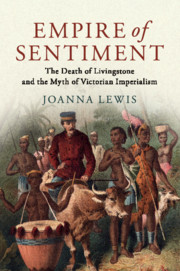Book contents
- Frontmatter
- Dedication
- Contents
- List of Figures
- List of Maps
- Acknowledgements
- Prologue: The Pathetic Death of Bwana Ingeleshi
- Introduction
- 1 ‘A Parliament of Philanthropy’: The Fight to Bury Livingstone
- 2 Laying to Rest a Victorian Myth: The ‘Lost Heart of the Nation’, Victorian Sentimentality & the Rebirth of Moral Imperialism
- 3 A Perfect Savagery: The Livingstone Martyrs & the Tree of Death on Africa's ‘Highway to Hell’
- 4 The Graveyard of Ambition: Missionary Wars, Bachelor Colonialism & White Memorials, Chitambo, 1900– 1913
- 5 White Settlers, Frontier Chic & Colonial Racism: How Livingstone's Three Cs Fell Apart
- 6 ‘The Hearts of Good Men’: 1973, the One- Party State & the Struggle against Apartheid
- 7 ‘Chains of Remembrance’: Livingstone, Sentimental Imperialism & Britain's Africa Conversation, 1913– 2013
- Conclusion
- Epilogue: The Testimony of Pastor Manduli
- Index
7 - ‘Chains of Remembrance’: Livingstone, Sentimental Imperialism & Britain's Africa Conversation, 1913– 2013
Published online by Cambridge University Press: 06 January 2018
- Frontmatter
- Dedication
- Contents
- List of Figures
- List of Maps
- Acknowledgements
- Prologue: The Pathetic Death of Bwana Ingeleshi
- Introduction
- 1 ‘A Parliament of Philanthropy’: The Fight to Bury Livingstone
- 2 Laying to Rest a Victorian Myth: The ‘Lost Heart of the Nation’, Victorian Sentimentality & the Rebirth of Moral Imperialism
- 3 A Perfect Savagery: The Livingstone Martyrs & the Tree of Death on Africa's ‘Highway to Hell’
- 4 The Graveyard of Ambition: Missionary Wars, Bachelor Colonialism & White Memorials, Chitambo, 1900– 1913
- 5 White Settlers, Frontier Chic & Colonial Racism: How Livingstone's Three Cs Fell Apart
- 6 ‘The Hearts of Good Men’: 1973, the One- Party State & the Struggle against Apartheid
- 7 ‘Chains of Remembrance’: Livingstone, Sentimental Imperialism & Britain's Africa Conversation, 1913– 2013
- Conclusion
- Epilogue: The Testimony of Pastor Manduli
- Index
Summary
Finally, we return to the subject of an emotion culture in Britain – a history of a sentimental imperialism sustained by multiple forms of Livingstone memorialisation and studies – from the time of colonial rule, up to the present day. This chapter examines how the Victorian legend of Livingstone lived on in metropolitan discourse through public commemorations and popular biographies. It exposes the incestuous relationship between sentimental feelings towards Livingstone, arguments for empire and imperial propaganda throughout the twentieth century. 1913 was the centenary of Livingstone's birth; 1973, the centenary of his death; and 2013, the bicentenary. At each major milestone, commemorative events, popular biographies and what might loosely be termed Livingstone studies marked a particular anniversary.
They matter because between 1913 and 1973, attitudes towards empire were often softened by feelings of sentimentality, generated and framed by commemorations, books, talks and newspaper coverage focused on Livingstone. An emotional conversation about Livingstone kept the belief alive that the British Empire in Africa was fundamentally humanitarian, built on good race relations and non-violent. Livingstone consistently pumped the beating heart of British liberal imperialism (see Figure 7.1).
Those responsible for this continuity of belief throughout most of the twentieth century were the Livingstone ‘experts’, mostly men, writing in tribute to a masculine hero, whom they admired, often believing him to be symbolic of a ‘lost’ ideal of manliness or the past (see Figure 7.2). For some, he offered a nostalgic sojourn into their childhood world and was a personal reminder of their fathers and grandfathers. Their feelings of admiration were more often personal rather than the product of an agenda to deliberately promote empire or mask its excesses. Nevertheless, the ‘horrors’ of the slave trade Livingstone depicted in his texts and in images, plus his sacrifice (and that of those who came after him), made them emotional about British motives in Africa (see Figure 7.3). The Arab slave trade, the violence depicted against women and children, and so on opened up a natural space to praise the humanitarian motives and ideals of the British Empire in Africa. Many of the Livingstone sentimentalists, whose influence over the voice of imperial liberalism was profound, were Scottish.
- Type
- Chapter
- Information
- Empire of SentimentThe Death of Livingstone and the Myth of Victorian Imperialism, pp. 212 - 245Publisher: Cambridge University PressPrint publication year: 2018



